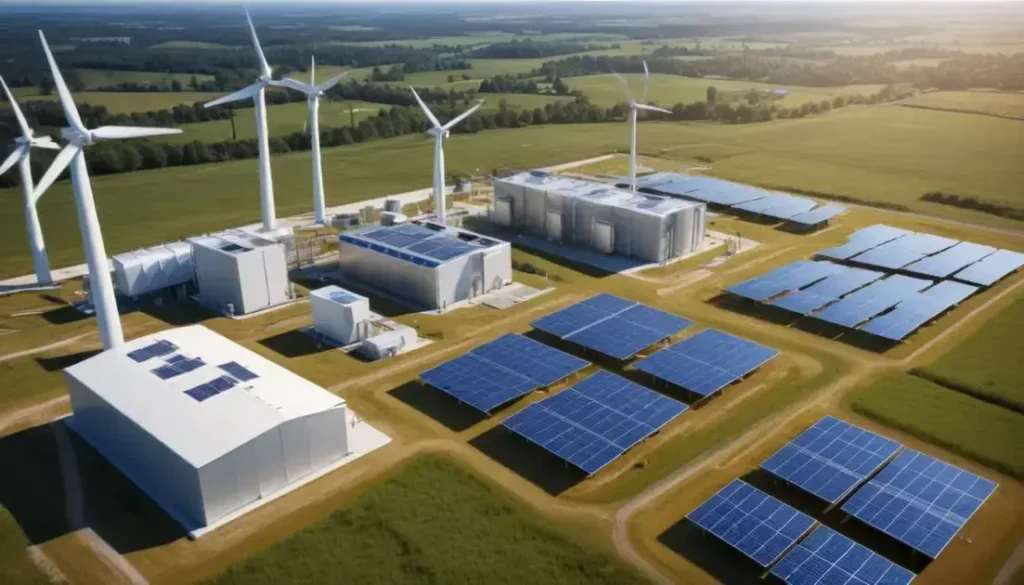Decarbonisation refers to the process of reducing carbon dioxide emissions through sustainable practices, including the adoption of renewable energy, improving energy efficiency, and embracing circular economy principles in business operations.
In the context of sustainability, decarbonisation emerges as a pivotal strategy for businesses. With the urgency of tackling climate change, understanding effective decarbonisation practices is essential for firms aiming to lead in this evolving landscape.
Introduction to global decarbonisation strategies
Decarbonisation is a critical focus for governments and businesses globally as they strive to mitigate climate change. The transition towards low-carbon economies requires innovative strategies and collaborative efforts. Countries worldwide are setting ambitious targets, aiming for net-zero emissions within the coming decades. This shift influences various sectors, including energy, transport, and manufacturing.
One of the core strategies revolves around increasing energy efficiency and transitioning from fossil fuels to renewable sources. Solar, wind, and hydroelectric power are leading the way, offering sustainable alternatives that reduce greenhouse gas emissions. By investing in new technologies, countries can modernise their energy infrastructures, creating green jobs and stimulating the economy.
Furthermore, international cooperation plays a significant role in successful decarbonisation. Countries work together to share best practices, develop stricter regulations, and support emerging markets in their sustainability efforts. The emphasis on innovation extends to maintaining carbon capture and storage technologies, which can help mitigate the environmental impact of existing industrial processes.
The role of investor pressure cannot be overlooked, as stakeholders increasingly demand transparency and accountability in corporate sustainability practices. Companies are now prioritising Environmental, Social, and Governance (ESG) criteria to attract sustainable investment, responding to the growing expectations of consumers and regulators alike.
Meet the key speakers at Sustainability LIVE London
The Sustainability LIVE London event features a lineup of key speakers who are leaders in the field of sustainability. These experts bring valuable insights and experiences from various sectors, aimed at addressing the pressing challenges of our time.
Industry Leaders: Among them are CEOs and founders of innovative companies, each contributing unique perspectives on their sustainability journeys. Their case studies showcase practical applications of sustainable practices and the benefits of integrating green solutions into business models.
Academic Experts: The event also includes prominent researchers who have dedicated their careers to studying the implications of climate change. Their presentations will discuss the latest findings on environmental impacts and the scientific basis for action in both policy and practice.
Government Representatives: Notably, several key policymakers will share their visions for a sustainable future. They will highlight legislative frameworks aimed at promoting sustainable development and fostering collaboration between the public and private sectors.
Attendees will have the opportunity to engage with the speakers through interactive sessions. These discussions will encourage questions and debate, making it a perfect platform for networking and sharing ideas on advancing sustainable practices across industries.
Understanding the decarbonisation panel discussions
The decarbonisation panel discussions at Sustainability LIVE London will focus on various strategies and challenges associated with transitioning to a low-carbon future. Experts from different sectors will share their insights on innovative solutions that can effectively reduce carbon emissions.
Key Topics: The discussions will cover essential topics such as the role of renewable energy, advancements in energy efficiency, and the importance of sustainable transport. Panelists will explore how these strategies can be integrated into current business practices.
Additionally, speakers will address the importance of collaboration among stakeholders, including governments, businesses, and non-profit organisations. They will highlight successful case studies where partnerships have led to effective decarbonisation efforts, providing a roadmap for others to follow.
The panels will encourage audience participation, inviting questions and discussions to explore the practicalities of implementing these strategies. This interactive format is designed to foster a deeper understanding of the complexities surrounding decarbonisation and encourage shared learning among attendees.
By sharing diverse perspectives, the decarbonisation panel discussions aim to equip businesses with the knowledge needed to navigate the evolving landscape of sustainability, ultimately driving the global agenda for climate action.
Key challenges in implementing decarbonisation
Implementing decarbonisation strategies presents several challenges that organisations must navigate to achieve their sustainability goals. One of the primary obstacles is the financial investment required for new technologies and infrastructure. Transitioning to renewable energy sources, such as solar and wind power, often involves significant upfront costs, which can deter businesses from making the necessary changes.
Another challenge is the regulatory landscape. Varying policies and regulations across regions can complicate efforts to develop a cohesive decarbonisation strategy. Companies must stay informed about local, national, and international regulations to ensure compliance and take advantage of available incentives.
Technological integration also poses challenges. Existing systems may not be compatible with new decarbonisation technologies. Businesses need to invest in research and development to create innovative solutions that enhance operational efficiency while reducing carbon emissions.
Cultural resistance within organisations can further impede progress. Employees may be hesitant to adapt to new processes or sceptical of the benefits of decarbonisation. Comprehensive training and clear communication about the advantages of sustainability initiatives can help overcome these barriers.
Lastly, measuring the effectiveness of decarbonisation efforts is essential for continuous improvement. Establishing reliable metrics and reporting systems ensures that companies can track their progress and adjust strategies accordingly.
Strategies for collaboration between governments and corporates
Collaboration between governments and corporations is essential for achieving ambitious sustainability goals. One effective strategy is establishing public-private partnerships. These alliances allow for resource sharing and joint investments in green technologies, enabling projects that might not be feasible independently.
Policy frameworks play a crucial role in guiding these collaborations. Governments can create incentives for businesses to adopt sustainable practices. Tax breaks, grants, and subsidies for renewable energy projects can motivate corporations to invest in decarbonisation.
Additionally, regular dialogue and engagement between governmental bodies and corporate leaders can enhance understanding of each other’s challenges and objectives. Collaborative forums and workshops can facilitate this interaction, allowing stakeholders to discuss best practices and innovative solutions.
Another important strategy is the development of shared sustainability goals. By aligning objectives, both parties can work towards common targets, enhancing accountability and transparency. For instance, committing to net-zero emissions by a specific date encourages corporations to integrate sustainability into their business models.
Furthermore, data sharing between governments and companies can facilitate better decision-making. Access to environmental data can help businesses optimise their operations, while governments can track progress on national sustainability targets effectively.
The role of technology in decarbonisation
Technology plays a pivotal role in the decarbonisation process, enabling significant reductions in carbon emissions across various industries. Innovations in renewable energy technologies, such as solar panels and wind turbines, have made clean energy sources more accessible and efficient. These advancements help businesses reduce reliance on fossil fuels and lower their overall carbon footprint.
Energy storage solutions have also evolved, allowing for better management of energy supply and demand. Technologies like advanced batteries facilitate the storage of excess energy generated from renewable sources, providing a reliable energy supply even during times of low production.
In addition, smart grids enhance energy distribution, improving efficiency and reducing waste. By integrating digital technology into electrical grids, utilities can optimise energy flows, respond to changes in demand, and manage distributed energy resources more effectively.
Another significant aspect is the use of carbon capture and storage (CCS) technologies. These innovations allow for the direct capture of carbon emissions from industrial processes, preventing them from entering the atmosphere. As CCS technologies mature, they provide a crucial tool for industries struggling to eliminate emissions entirely.
Lastly, advancements in data analytics enable businesses to track and analyse their carbon emissions accurately. By leveraging big data and machine learning, companies can identify inefficiencies and implement targeted decarbonisation strategies that maximise impact.
Highlights from past Sustainability LIVE events
Past Sustainability LIVE events have showcased a wealth of insights and innovations in the field of sustainability. Attendees have benefited from a diverse range of workshops and panel discussions, featuring industry leaders sharing their experiences and strategies for achieving sustainability goals. The interactive format has facilitated direct engagement, helping participants learn from one another.
One highlight has been the focus on renewable energy solutions. Sessions on solar, wind, and sustainable building practices have provided practical knowledge, enabling businesses to adopt greener practices effectively. Participants have reported increased understanding of how to integrate these solutions into their operations.
Another significant aspect has been the exploration of circular economy principles. Discussions have centred around waste reduction and resource management, offering actionable insights that organisations can implement to minimise their environmental impact. Case studies from innovative companies have illustrated the benefits of shifting towards a circular model.
Sustainable finance has also been a focal point, with experts outlining the importance of funding sustainable initiatives. Many participants have gained insights into securing investment for green projects, which can play a crucial role in driving decarbonisation efforts.
Networking opportunities have been abundant, allowing attendees to connect with like-minded professionals, fostering future collaborations and partnerships aimed at promoting sustainability across various sectors.
Insights from major industry players
Insights from major industry players are crucial in shaping the future of sustainability and decarbonisation. Leading companies are increasingly sharing their experiences, showcasing best practices and innovative approaches to achieving environmental goals. These insights provide valuable lessons for other organisations aiming to enhance their sustainability efforts.
One notable trend is the shift towards integrating sustainable practices into core business strategies. Companies are now recognising that sustainability is not just an add-on but a fundamental aspect of their operations. By embedding sustainability into their business models, organisations can not only reduce their carbon footprint, but also drive competitive advantage.
Industry leaders are emphasising the importance of collaboration. Many are forming strategic partnerships with other businesses, NGOs, and governmental bodies to tackle common challenges in the quest for sustainability. These collaborations foster innovation and accelerate the deployment of green technologies.
Data-driven insights are also gaining traction. Companies are utilising advanced analytics to track their sustainability performance, set ambitious targets, and communicate progress transparently. This approach not only promotes accountability but also boosts stakeholder trust.
Moreover, major players are advocating for a circular economy model. By rethinking product design and focusing on resource efficiency, they are paving the way for a sustainable future that maximises value while minimising waste.
Conclusion: the urgency of action
The urgency of action in addressing climate change and promoting sustainability has never been more critical. As evidence mounts regarding the impacts of global warming, businesses, governments, and individuals are called upon to take immediate steps towards decarbonisation. Collective efforts are essential to avoid the devastating effects of climate change.
Organisations must prioritise sustainable practices and embed them into their core operations. This includes enhancing energy efficiency, transitioning to renewable energy sources, and adopting circular economy principles. By doing so, they can contribute significantly to reducing carbon emissions while also achieving operational efficiencies.
Furthermore, transparency in reporting and sharing progress on sustainability goals is vital. Stakeholders, including customers and investors, increasingly demand accountability and clarity regarding the environmental impact of business activities. Companies that lead in sustainability will not only enhance their reputation but also secure a competitive edge in the market.
Collaboration across sectors is crucial for scaling up impactful solutions. Businesses, governments, and non-profit organisations must work together, sharing knowledge and resources to drive innovation and overcome common challenges. By creating a coalition of committed partners, significant strides can be made towards a sustainable future.
In summary, the time to act is now. Prioritising sustainability can lead to long-term benefits for both the planet and the economy, paving the way for a resilient future.
The Urgent Need for Action
In conclusion, addressing climate change requires immediate and collective action from all sectors of society. The evidence is clear: we must act now to reduce carbon emissions and promote sustainable practices.
Businesses have a vital role to play by integrating sustainability into their core strategies. This approach not only helps the planet but can also lead to cost savings and new opportunities for growth.
Collaboration between governments, industries, and communities is essential. By working together, we can share knowledge and resources, creating a stronger impact than any individual effort can achieve.
The time for sustainable actions is not tomorrow but today. By prioritising sustainability and taking decisive steps, we can create a healthier planet for future generations and drive economic growth in a sustainable manner.
People also ask
What are the main benefits of adopting sustainability practices?
Adopting sustainability practices can lead to cost savings, improved brand reputation, and access to new market opportunities, while also contributing to environmental preservation.
How can businesses start their journey towards decarbonisation?
Businesses can start by assessing their carbon footprint, setting clear sustainability goals, and identifying areas where energy efficiency can be improved.
Why is collaboration important in achieving sustainability goals?
Collaboration allows for sharing best practices, resources, and innovations, leading to more effective solutions and greater impact in the fight against climate change.
What role does technology play in decarbonisation?
Technology enables the development and implementation of renewable energy solutions, carbon capture methods, and data analytics to track and optimise sustainability efforts.
How can companies measure their sustainability progress?
Companies can measure sustainability progress through key performance indicators (KPIs), regular reporting, and using sustainability frameworks that specify targets and benchmarks.
What challenges do companies face when implementing sustainable practices?
Companies often face challenges such as financial constraints, regulatory complexities, and resistance to change within the organisation.


